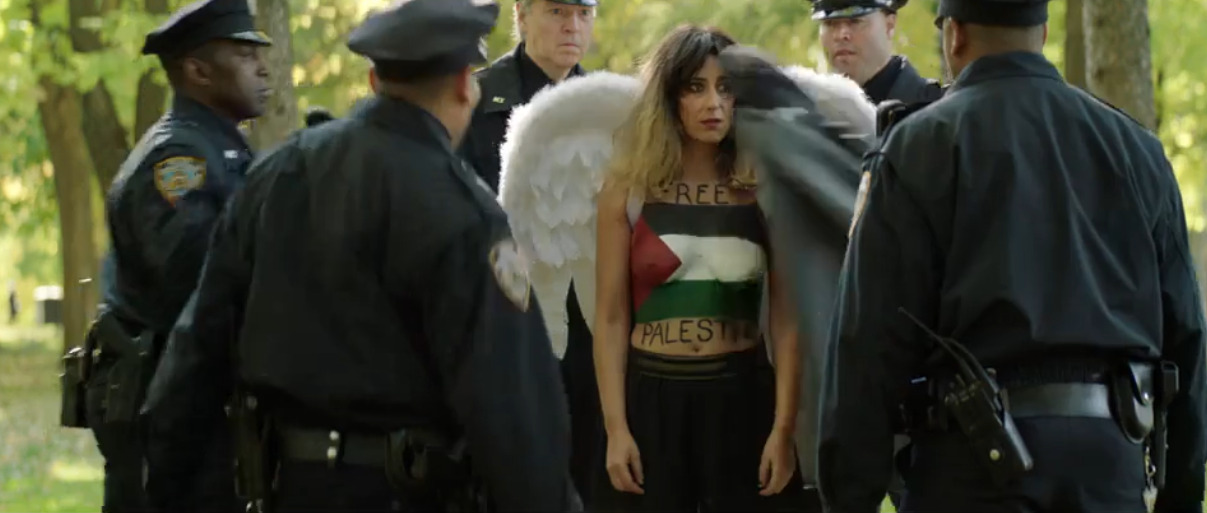Occupation under fireworks and tear gas canisters
Elia Suleiman’s It must be heaven and Emily Jacir’s Letter to a friend, both from 2019, concentrate on the ongoing Palestinian occupation while using similar themes, but very different style choices in filming. Suleiman prefers a more linear narrative style, though full of symbolism, whereas Jacir presents her work in the form of a documentary/video essay. Though different in style, they seem to be after the same thing: a platform to share their story. I believe that the two pieces have a few more elements in common, including how they cope with the occupation, and their desire to know more – anything that might renew their hope – about the future of their homeland.
Symbolism and irony: How to cope through Palestinian occupation
In both pieces, the audience is able to witness glimpses of irony to make the narrative just a bit easier to digest while still requiring a good amount of reflection. In Suleiman’s film, he travels from Nazareth to France and then to New York in order to see if a production firm will produce his film about Palestinian and Israeli conflict. While doing so, his stay in Western countries makes him project some of the things he sees and witnesses into bits of his life in occupied Palestine. For instance, while in France, he walks around a surprisingly empty Paris, while noticing was planes in formation flying in the skies, along with many tanks and many sets of policemen, some on horses, some on roller skates. What he realizes afterwards is that what looked like a preparation for war was a preparation for a French parade. Additionally, he hears fireworks which, out of the camera shot sound like shots. I also believe that other that the almost surreal symbolism that Suleiman conveys in the Paris sequence, he might also want to do a bit of satirical critique of the role of French as a colonizer (and ready to be at war).
Fireworks are an element that is common to Jacir’s film. Her dog is traumatized by the loud noise of tear gas canisters exploding daily just outside their home, that he associates the sound to the one of fireworks, causing him to go into hiding in between two doors. Though Jacir’s tone throughout the film is more informational and serious, I believe she leaves some room for irony as well. Indeed, since tear gas is often exploded outside her home, the canisters end up in her garden. She then starts the film by saying that she is collecting and sending them to the recipient of her plead. The satirical part is when she goes back to the canisters later in the film, when a lady collects those canisters as well in order to give them to tourist as a souvenir (but also a s a tool of awareness of the current condition).
A glimpse of hope into the future
The second element that both Suleiman and Jacir share in their works is the desire to learn more about their future, and the future of their homeland. In It must be heaven, as Souleiman is presented with another rejection for the production of his film, he goes to a card reader and asks about the future of Palestine. The fortune teller is initially ecstatic, saying that there will be Palestine; however, a few seconds later he realized he misread the cards, so he adds that Palestine will be once again, but not in Souleiman’s lifetime. Similarly, the whole purpose of Jacir’s filming is a plea to a friend, asking him to conduct a preempting investigation in order to know how much longer she has in her home before Israeli settlements will occupy that too.
Four words and a painted flag: Enough to stir our spirits
In addition to elements this film might have in common with Jacir’s, It must be heaven offer two moments that, alone, I believe they have the power of stirring the audience’s spirits. During his travel, Suleiman’s character does not say much (in line with his previous film). In fact, he only utters four words: “Nazareth” and “I’m Palestinian”. Hence, not only he manages to convey his identity and make it count, but he does so while in New York City, in the USA, where a Palestinian might not receive the same kind of welcome that an Israeli citizen might receive. The other moment that I found really powerful was when, while in Central Park, Souleiman’s character meets a young woman dressed as an angel, who reveals a Palestinian flag painted on her bare chest. I found this moment powerful because, as she reveals her identity (or intent to protest), she is followed by police and covered up (Image 1). However, it tricks an inexperienced viewer to believe that she is being covered up because her upper torso is naked in a public space, and not because she’s publicly displaying a Palestinian flag in support of its freedom.
